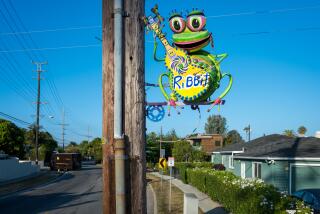Municipal versus private power
Today’s topic: Why is it so important for L.A. to have municipal power? And has the city done enough to encourage utility consumers to invest in solar panels and generate electricity for the grid? Previously, Leonard and Humphreville debated the polarized views in City Hall on Measure B and the political machinations behind the ballot measure.
Remember Enron?
Point: Sarah Leonard
The motivation of investor-owned power generation is to keep the demand for power greater than the supply. This causes prices -- and therefore profits -- to increase. By manipulating the power supply in 2000 and 2001, Enron and other energy traders were able to extort enormous profits. But this did not happen in Los Angeles. We were immune because our public utility, the Los Angeles Department of Water and Power, generated its own power.
As a municipal utility, the DWP operates for the benefit of its customers who own it, not distant shareholders. When DWP operates the plants that produce our power, we can be sure that energy is coming into the system for the minimum cost of production. No one will decide that profit is worth more than the reliability of your power.
Utility-owned generation, which is at the heart of Measure B, protects consumers.
Measure B would require the DWP to install solar panels on roofs across the city, producing 400 megawatts of utility-owned solar power by 2014 -- enough to meet our growing power needs with clean energy rather than fossil fuels. It would create jobs and business in L.A. rather than out of state, while ensuring customers continue to enjoy the lowest rates in Southern California.
DWP rates are so low because we produce our own power. Residents of Los Angeles felt the benefits a few years ago, when they avoided the blackouts and huge price spikes that plagued the parts of Southern California that relied on purchasing power in the market, which can be manipulated by greedy speculators.
Utility-owned generation also gives us power that is more resilient, something we all saw during recent fires when the DWP was able to maintain and restore power while other utilities took days to do so.
The opponents of Measure B often claim that power can be bought cheaper than we can generate ourselves. This is simply not true. Moreover, what they don’t tell you is that the “power purchase agreements” they advocate have escalator clauses that can lead to large cost increases. Under such agreements, the ratepayers would have nothing to show for the higher bills because the assets would belong to the energy producers. Measure B would protect ratepayers from these type of contracts because we would be producing the power ourselves.
Until now, the DWP has generated just 13 megawatts of solar power. That is less than 1% of the power we use. More than 75% of our power is generated from fossil fuels. It’s time to change this. That is why we are asking L.A. voters to support Measure B on March 3. It will require the DWP to take this bold step to increase our use of clean solar power owned by our utility, thereby protecting customers and creating jobs.
Sarah Leonard is a spokeswoman for the campaign supporting Measure B.
An open system is a better way to go green
Counterpoint: Jack Humphreville
L.A. ratepayers have benefited from municipal power in large part because of the significant tax advantages that allow the DWP to borrow at significantly lower rates than investor-owned utilities such as Southern California Edison. We have also benefited from owning our own power plants, an arrangement that ensures us a reliable energy supply even during times of crisis.
The alternative to Measure B, establishing a solar program via a City Council ordinance versus the ballot box, would not change the ownership structure of the DWP’s assets. We would still benefit from the lower interest rates and reliable, DWP-owned power sources. As matter of fact, the DWP and its ratepayers would benefit significantly under a solar program passed as a City Council ordinance because the DWP would be able to rely on Southern California companies that have the management experience, trained union workers and supply sources that would result in a more efficient building process. What we have instead is Measure B, which would carry with it the cost overruns associated with the DWP’s steep learning curve on solar energy, its management issues and its labor shortages.
The creation of an open system in which many companies and skilled workers gain experience in solar energy is a much better way to create a viable solar industry here in Southern California. Under the monopolistic, no-bid, sole-source system envisioned by Measure B and controlled by the DWP, the City Council and union leadership, the people who have experience with solar energy would be shut out. As it is, the DWP’s rates are 15% to 20% higher than other California municipal utilities.
An open system would encourage DWP customers to invest in installing their own solar panels and generate electricity for their own use and for the grid. Under this system, these customers would not be under the restrictive rules required by Measure B, where all power generated must go through the DWP’s meters first.
Of course, the DWP can be instrumental in helping its customers go green. By developing public-private partnerships with its customers, the DWP can provide the necessary grid technology and financial incentives to encourage its customers to make these expensive investments. An integral part of this effort is to make sure that there are sufficient suppliers and trained workers to install the necessary equipment efficiently. The DWP would have clean energy at little or no capital cost, which would help maintain its high credit rating.
By leveraging DWP’s buying power and its financial strength, we can create a solar industry that would supply not only our needs, but those of the rest of world. Such an open system would create many more jobs than the monopolistic one envisioned by Measure B. The goal here is green power.
As for Enron, it is very important to remember not to repeat the same mistakes by passing Measure B without a full public vetting and financial analysis.
Jack Humphreville, the DWP ratepayers advocate for the Greater Wilshire Neighborhood Council, wrote the ballot argument opposing Measure B.
More to Read
A cure for the common opinion
Get thought-provoking perspectives with our weekly newsletter.
You may occasionally receive promotional content from the Los Angeles Times.










